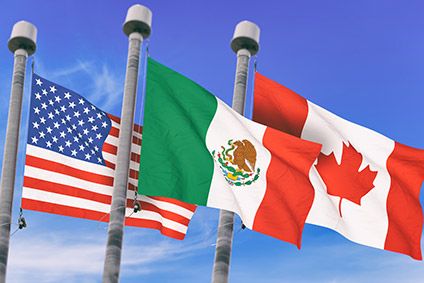
Apparel and garment trade bodies have applauded the deal reached between the US, Mexico and Canada to lift the tariffs imposed on steel and aluminium and the removal of subsequent retaliatory tariffs.
According to a statement from the Office of the US Trade Representative (USTR), the US is lifting Section 232 tariffs on steel and aluminium imports from those countries and for the removal of all retaliatory tariffs imposed on American goods by those countries.
“The agreement provides for aggressive monitoring and a mechanism to prevent surges in imports of steel and aluminium,” USTR said. “If surges in imports of specific steel and aluminium products occur, the United States may re-impose Section 232 tariffs on those products. Any retaliation by Canada and Mexico would then be limited to steel and aluminium products.”
President Trump imposed the tariffs of 25% on steel and 10% on aluminium from Mexico and Canada, citing a controversial national-security clause in US trade law known as Section 232, in June of last year.
This March, Mexico announced it would not agree to any deal unless the tariffs on steel and aluminium were lifted.
See Also:
In an email to just-style, Bob Kirke, executive director of the Canadian Apparel Federation, said Canada would not have been able to ratify the new NAFTA agreement if tariffs had remained in place on steel and aluminium.
How well do you really know your competitors?
Access the most comprehensive Company Profiles on the market, powered by GlobalData. Save hours of research. Gain competitive edge.

Thank you!
Your download email will arrive shortly
Not ready to buy yet? Download a free sample
We are confident about the unique quality of our Company Profiles. However, we want you to make the most beneficial decision for your business, so we offer a free sample that you can download by submitting the below form
By GlobalData“So the recent agreement certainly helps the Canadian government to move forward. I do not believe there is any major impediment to ratification.
“However the Canadian Parliament will rise at the end of June and will not sit again until after our October election. For that reason I do not believe we will ratify it until the fall. There simply is not enough time to debate and pass the legislation. Similarly, it is quite up in the air whether Congress will ratify the agreement in the near future.”
Meanwhile, in a Twitter post, president and CEO of the National Association of Manufacturers, Jay Timmons, said the move would now help advance USMCA.
@POTUS actions on tariffs today will help advance USMCA. We are now one step closer to a trade deal that opens markets, raises standards, provides enforcement and modernizes trade rules so that manufacturers across the United States can grow our economy…
— Jay Timmons (@JayTimmonsNAM) May 17, 2019
Manufacturers look forward to working with Congress and the Administration to get this over the finish line.
— Jay Timmons (@JayTimmonsNAM) 17 May 2019
The news was also welcomed by the National Cotton Council which issued a statement commending the President and his Administration on the outcome.
“While cotton and cotton textile products have not been subject to retaliatory tariffs in these key markets, this action represents one of the necessary and significant steps to create a pathway for Congressional approval of the US Mexico Canada Agreement (USMCA) this year,” NCC chairman Mike Tate said. “The cotton industry appreciates the focus by President Trump and the Administration to remove the tariffs.”
The Alabama cotton producer noted that the NCC will continue to help educate Members of Congress “on the importance of timely USMCA approval to restore certainty in the North American market, which represents significant export market share for both US cotton and cotton textile products.”
President and CEO of the National Retail Federation, Matthew Shay, added: “We applaud the administration for reaching a resolution with Canada and Mexico on the steel and aluminium tariffs. Lifting these tariffs will support consumer confidence and provide much-needed relief for American businesses large and small. Congress should build on this progress by passing USMCA and modernising the rules for North American trade.”







